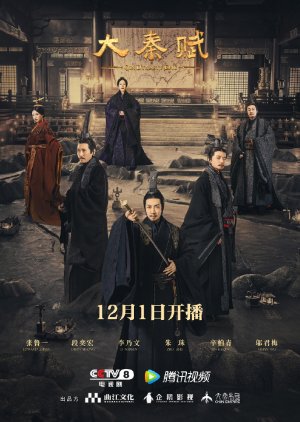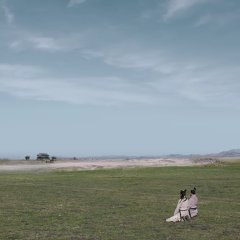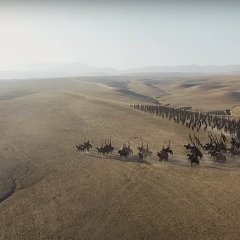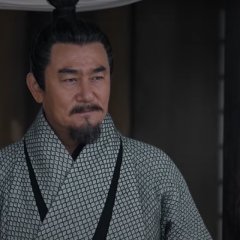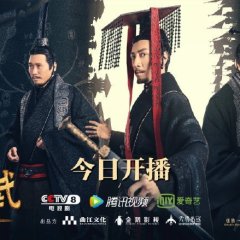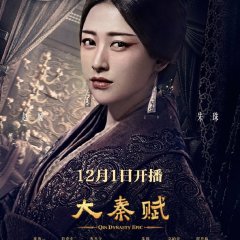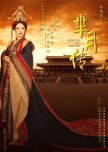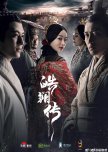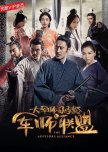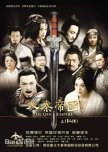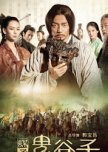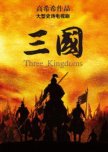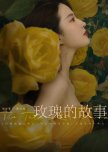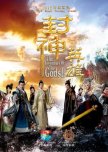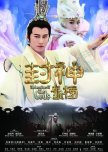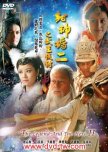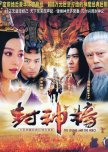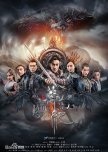 2020 Chinese Dramas Sampler
2020 Chinese Dramas Sampler - Italiano
- 中文(台灣)
- Español
- magyar / magyar nyelv
- Titolo Originale: 大秦赋之东出
- Conosciuto Anche Come: Da Qin Di Guo Zhi Tian Xia , The Qin Empire IV
- Generi: Storico, Politico
Dove Guardare The Qin Empire 4
Gratis (sub)
Subscription (sub)
Gratis (sub)
Subscription (sub)
Cast & Ringraziamenti
- Edward ZhangYing ZhengRuolo Principale
- Duan Yi Hong Ruolo Principale
- Li Nai Wen Ruolo Principale
- Zhu Zhu Ruolo Principale
- Vivian WuMrs. Hua YangRuolo Principale
- Xin Bai QingYing Zi Chu [Father of Ying Zheng]Ruolo Principale
Recensioni

PeachBlossomGoddess
30 persone hanno trovato utile questa recensione
When you play the game of thrones, you win or you die.
Qin Dynasty Epic, the fourth and final installment of the highly regarded Qin Dynasty series, is about how Yin Zheng fulfilled "Heaven's Mandate" to unify the Warring States (475-221 BC) and became the first emperor of China at age 38 in 221 BC. Such a monumental task was not achieved without the vision and dedication of many great talents from brilliant tacticians, crafty spies, talented engineers and powerful generals. These characters that made it all possible and how they were pitted against wily and determined opponents from six rival kingdoms is magnificently and vividly brought to life in this stunning production.The production values are very high and there is extraordinary, game of thrones worthy battle footage against some truly breathless backdrops that convey the epic vastness and splendor of the empire. In-depth research and meticulous attention to detail are evident in the costumes, the weapons, the sets and the authentic portrayal of military strategies, diplomacy, espionage, the economics of funding prolonged warfare, the evolution of a common script, immigration and the consequent racial frictions and the conflict between meritocracy and legacy. These themes are seamlessly woven into the visual storytelling in a way that you cannot miss the natural, impenetrable mountain fortress that is Hangu Pass and the Qin life size battle map that further reinforces the topological and geographical advantages of the Qin state.
This is a historical drama but if you are not familiar with Qin history, then be warned that there are mild spoilers in the paragraphs ahead.
Duan Yihong's delicious portrayal of Lv Buwei, venal merchant turned kingmaker and indisputably one of history's great adventurers anchors well over half the drama. His economic reforms and policies paved the way for the eventual unification of the Warring States well before Ying Zheng's conquests began. This is the best written and best acted role in the drama that literally steals the show. This wonderfully grey character that was so inspired by a vision bigger than himself that he actively recruited and promoted the best talent even against his own nature and interest, notably in the case of Li Si. Their scheming both as rivals and allies and mutual respect despite their differences is one of the most complex and riveting portrayals in this drama. I find Li Si the character insufferable and while Li Naiwen's acting is good, it is not quite on par with that of Duan Yihong. Even though I think the drama ends at the right place, it is a pity we don't get to see the irony that Li Si whose life work was Qin's unification may have brought about Qin's rapid downfall with his cruel interference in Ying Zheng's succession. I love that this drama properly credits both Lv Buwei and Li Si with many of the lasting reforms made during Ying Zheng's reign; indeed many (not all) were well underway while he was still a powerless boy king.
The most slanderous and malicious accusation in Sima Qian's Shiji (史记 or Records of the Grand Historian) is that Ying Zheng was in fact Lv Buwei's son; that his former concubine Zhao Ji was already pregnant when she married Ying Yiren. Current historians are rightly skeptical as that would have been a 12 month pregnancy but the drama raises the question head on and leaves room for viewers to decide for themselves. It is likely no accident however, that they cast two actors that bear a strong resemblance to each other as Ying Yiren and Ying Zheng; both in terms of stature and elongated, elegant facial features and in sharp contrast to both Zhao Ji and Lv Buwei's more common rounded features. The desire to put both actors side by side results in the drama's biggest judgement error of having a 40 year old man play the 13-year old Ying Zheng. This is a tall ask of any actor and Zhang Luyi did the best he could but it isn't until well over halfway through the drama that the character's age catches up with that of the actor. In a misguided attempt to make Ying Zheng more relatable, we suffer through some unfathomable cringe dialogues as the obviously middle aged Zhang Luyi plays an adolescent Ying Zheng who is bullied, questions his legitimacy, experiences infatuation and grapples with his mommy issues.
In an attempt to appeal to broad audiences, the drama over-indulges in the salacious Lao Ai/Zhao Ji arc. Zhao Ji is mercilessly portrayed as the wanton, shallow, selfish, reckless and easily manipulated harlot who likely turned Ying Zheng into a misogynist whose women were all anonymous. And while Lao Ai's allegedly majestic physical attributes can never be disproven, he definitely had a peanut sized brain and his attempted coup was puny and nowhere near the scale the drama suggests. Although scandal holds timeless appeal, I am here to watch the first emperor of China, not the first gigolo of China. The time would have been better spent building up characters who become prominent after Lv Buwei's exit and indeed the immediate next 1-2 episodes feel like one hand clapping.
I must mention that Zhang Lu Yi redeems himself with his characterization of the mature Ying Zheng. I was riveted by how he howled like his heart was torn from him when he "fulfilled" Zhao Yan's abominable request only to be overcome with remorse and cowardice when faced with the real thing years later. His portrayal of Ying Zheng's encounter with Jing Ke is also exceptional. That said, I have mixed feelings about how this larger than life figure was written, it somewhat diminishes him. While I like that they humanized him and gave him a benevolent side that is at odds with countless other depictions, I wish they went with a bolder, more controversial interpretation by balancing that out with some vices and a more ruthless, darker side as well. I didn't need to see him cook scholars but even how he dealt with Lao Ai's kids was just glossed over, not to mention his legendary harem and his intense superstition. The real Ying Zheng is probably turning in his undisturbed tomb at this millenial, tree hugging, touchy feely characterization that robs him of the requisite ruthlessness to do great and hard things.
While there are many epic battle scenes the unification wars were fought just as much behind the scenes as on the front lines as all warfare is based on deception. By the time Yin Zheng took over, the six kingdoms appeared to be largely sitting ducks but nonetheless, they put up a really good fight. While the conquest of the remaining kingdoms after Zhao (especially Chu) feels a bit rushed, all the important moments are there. I really felt for the vanquished in this show, was moved by their desperate causes and teared up at their inevitable defeats. The sense of loss experienced by the de-throned young Zhao king with his mother and uncle as regent could have well have been the young Ying Zheng. Under resourced, out smarted, undermined by their own and with the odds against them, Li Mu, Prince Fei and Prince Dan still fought bravely and valiantly. But when you play the game of thrones, you win or you die.
One of my favourite Cantonese expressions is 七国咁乱 which roughly means as chaotic as the warring states. I always find making sense of that messy, turbulent period of Chinese history so mind boggling that I cannot praise enough the clean, smart way this drama's narrative navigates the multitude of important events and characters that lead to the unification of China under Qin and the reforms and contributions that lasted thousands of years. Yes, there are some flaws, some missed opportunities and digressions that do not detract much from this sumptuous and enveloping historical drama that makes this a very solid 9.0 for me.
Questa recensione ti è stata utile?

History enthusiasts should not miss this
As the old adage goes, save the best for last. How appropriate, as this is the final drama that I’ve completed before 2020 draws to a close. Personally for me, I consider Qin Dynasty Epic as the best historical non-fiction C-drama production of the year. Aside from being extremely well made, there is simply no other similar non-fiction historical produced this year capable of competing with this drama. Hopefully this brief review provides potential viewers a general idea of what to expect.This is a big budget production and it really shows. The high quality cinematic colour grading, exceptional cinematography and camerawork, elaborately constructed sets, lavish costumes, well-executed action choreography and battle scenes, as well as beautiful vast landscapes, among various other aspects. Principal photography took place at Hengdian World Studio along with gorgeous locales such as Nalati, Sailimu Lake, Changji, Wuerhe, Xiangshan, Duyun, and Xianju. It had been reported in Chinese entertainment news outlets that over 11,000 sets of costumes as well as 4,000 sets of armour were produced for this show alone. Everything looks visually stunning on a very grand scale.
This drama, the fourth and final series in the Qin Dynasty franchise, chronicles the humble beginnings of Qin Shi Huang, the first emperor of China, up to the point of unification and establishment of the first imperial dynasty of China, the Qin Dynasty (around 259 BC to 221 BC). The plot follows very closely the Records of the Grand Historian, written by Sima Qian, as I understand from more knowledgeable viewers on the subject matter. How certain events truly transpired, no one will ever know. But, at the very least, the major events recorded are generally covered, with some degree of dramatization as expected of a drama. It’s worth mentioning here that unlike the first 3 series which are based on the novel, The Qin Empire by author Sun Haohui, critics noted that the script for this latest instalment is not adapted from the novel.
The performance of the ensemble cast is nothing short of remarkable. Aside from Zhu Zhu, whom I’ve come across in American productions, I’ve never seen the rest of the main cast previously but their acting in this drama is testament to their immense talent indeed. The trio of Zhang Lu Yi, Duan Yi Hong, and Li Nai Wen are outstanding in their portrayal of the central characters of Ying Zheng, Lv Bu Wei and Li Si. For me, those three actors carried the entire show. In particular, Duan Yi Hong’s unique version of the complex character Lv Bu Wei deserves much praise. The huge supporting cast, especially the veterans, also deliver an impressive depiction of their respective characters.
The screenplay involving the numerous convoluted political power plays and complicated stratagems used in court machinations and on the battlefields is very cleverly written and deftly executed throughout the entire show. Nothing is ever as it seems and no character is above the use of tactical maneuverings to gain any sort of advantage.
However, the drama is not without flaws, the major issue being the casting of a 40-year old man as a 13-year old boy. I don’t think I need to elaborate more here. For a big budget production, this falls short of the required standard and therefore, a deduction of points for this glaring error of judgment.
In addition to that, certain dramatization of major events, particularly the story arc concerning the infamous pseudo-eunuch and the Queen Dowager, lasts longer than is perhaps necessary. As a result, other more meaningful historical events are not fully fleshed out or shown in greater detail.
Although 78 episodes represent a massive investment of viewing hours, Qin Dynasty Epic presents an utterly compelling insight and in-depth exploration into the origins of China's first imperial dynasty and the long and arduous journey to unification of the many splintered ancient kingdoms and vassal states. For enthusiasts of history, particularly ancient Chinese history, this is an opportunity not to be missed. Being the final installment of the highly successful Qin Dynasty franchise which started back in 2009, it might be a very long while before another epic historical production based on the warring states era gets commissioned, if ever again.
Questa recensione ti è stata utile?

